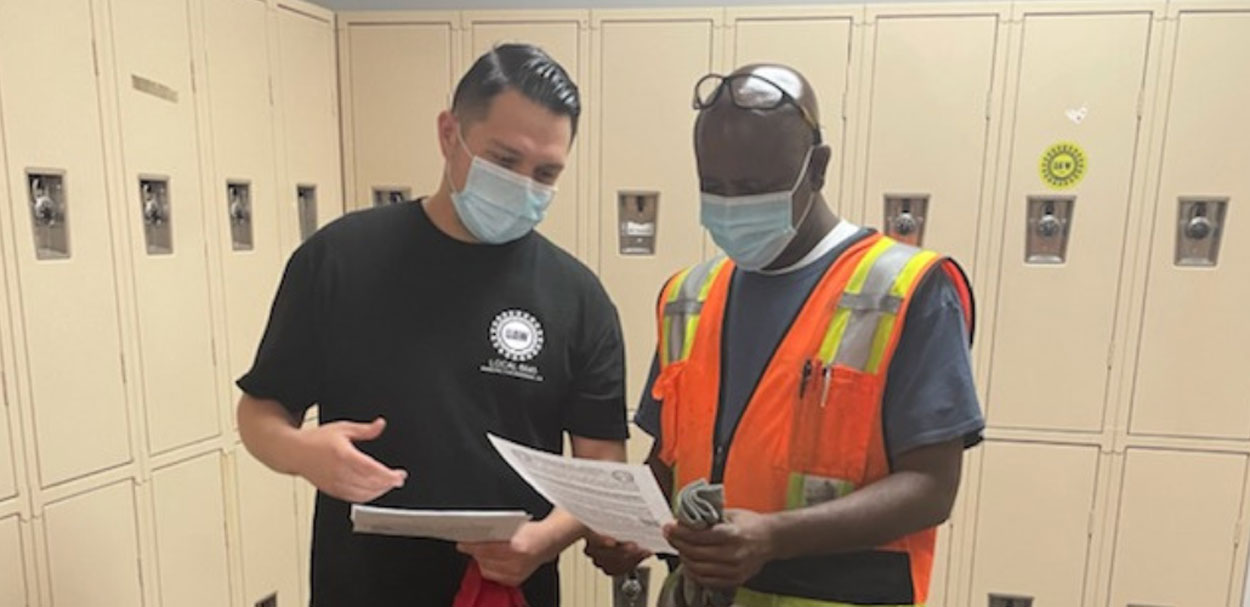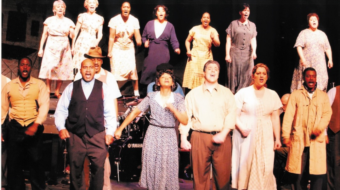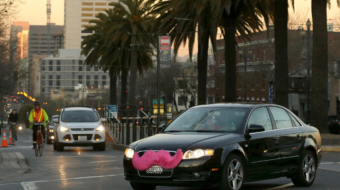
DETROIT (PAI)—The Auto Workers are going to take on the Detroit 3 over two-tier pay.
A bugaboo for the union since the Great Recession of 2008 bankrupted both GM and what was then FiatChrysler, corporate greed has since forced such systems on workers—where veteran unionists are on a much-higher pay scale, with benefits, than their greener colleagues, who also lack benefits. Yet they toil side-by-side at the same tasks.
On the opening day of the union’s four-day convention in Detroit, delegates made it clear two-tier pay systems are anathema. One resolution told the union’s executive board to “reject management proposals which seek to divide the membership through tiered wages, benefits or post-employment income and benefits,” as Detroit-area delegate Bill Parker explained in a video later posted on YouTube.
“Where current contracts provide for such divisive compensation, it shall be the obligation of” the board “to seek elimination of all such tiers by raising lower tiers to the higher level, holding to the long-standing union principle of equal pay for equal work,” Parker said.
“We need to put to bed the tragic insertion of tiers into this union.”
But a proposal to insert the anti-two-tier language into the union constitution, making it a mandate to the board, failed. So did a proposed constitutional amendment enshrining equal pay for equal work, though debate showed support for equal pay as a general proposition.
At one time the idea of a wage system in which workers toiling side by side, doing the same work, would be on different pay scales was, to U.S. auto workers, an unimaginable nightmare scenario. Once the union agreed to such a system in one plant the companies rapidly forced adoption of two-tier plans in more and more locations across the country. Many locals and many union members across the country have hated the two-tier systems and now their union is pledged to lead a fight to eliminate them.
Discussion of two tiers and the union’s new one-member one-vote election system for top officers, from the president down through the executive board, dominated that first day, July 25. The convention runs through July 28.
On their second day, delegates voted to start strike pay on Day 1, not Day 8, and to raise the amount to $500/week from $400, and eliminated language that prohibited strike pay to workers receiving jobless benefits, the union reported on its website.
“Today’s increase builds upon the changes” the board implemented “to strengthen the hand of workers at the bargaining table,” the union quoted President Ray Curry as saying. “UAW members have high expectations around bargaining, and raising the strike pay is a statement from UAW delegates they are ready to fight for the wages and working conditions UAW members deserve.”
Delegates met at their first conclave after a massive financial scandal which ultimately sent past UAW Presidents Gary Jones and Dennis Williams, 10 other top officers and the widow of another to federal prison.
UAW’s December 2020 consent decree with the Justice Department, which prevented a federal trusteeship of UAW, also ordered a referendum on changing union elections to one-member, one-vote balloting. That proposal, pushed by Unite All Workers for Democracy (UAWD), a reform caucus, won 63%-37% in 2021 in a 14% turnout, the union reported in December 2021.
As a result, there will be a contested mail-in election, with a November 28 deadline for receipt of ballots at the counting site, preceded by a candidates’ debate in September. Proposals to let retirees vote in the election and for ranked-choice voting lost. Instead, there will be runoffs if no one wins a majority in mail-in balloting.
“‘No corruption, no concessions, no tiers’ is UAWD’s rallying cry. Now is the time to enshrine ‘no tiers’ in the UAW Constitution, before our upcoming negotiations in 2023,” the reform caucus declared. Though the delegates hate two-tier, enshrinement lost on the convention floor.
UAWD nominated Shawn Fain, a skilled trades worker, shop chair for Local 1166 at the Chrysler plant in Kokomo, Ind., for president. His running mate is Margaret Mock, treasurer and financial secretary for Local 961 at Detroit Axle, seeking the Secretary-Treasurer’s job.
Delegates reported literature for a slate headed by current President Ray Curry circulated often. Curry led off his lengthy pre-convention report book with a short discussion of the scandal.
“Criminal misconduct of UAW leadership shook confidence in our institution,” he wrote. “A fire at UAW headquarters displaced staff. Months later, the pandemic arrived. We had a very consequential presidential election in 2020 which led to a White House whose support of organized labor is unparalleled.”
“The UAW retained outside experts to assist the union in analyzing and improving its accounting and financial controls systems, policies, and processes from top to bottom,” his president’s report added. It also hired “a new and more robust independent outside auditor to conduct the semi-annual and annual audits.”
And UAW hired a Compliance Director “to oversee and direct” centralized compliance and created a new and comprehensive code of conduct covering “all the rules and policies governing ethical and workplace behavior and requiring annual certifications of compliance.”
Curry then spent much of the rest of his report extolling member activism, including a 40-day strike at “new GM” in 2019, which Curry calculated cost it $4 billion in profits.
Says tiers will be gradually eliminated
Curry said the winning strike would lead to gradual elimination of the tiers and a quicker path to top-scale pay and benefits for new hires.
“Members at GM, Ford and FCA achieved their top priorities of providing a pathway for temporary and supplemental workers to achieve full-time status, significantly shortening the in-progression period for current members to reach the top wage rate, and winning large future investment and job commitments, all while maintaining current health care plans with no premium sharing or additional cost,” he said.
The two tiers have been a thorn in workers’ sides ever since the 2008 financier-caused Great Recession, which threw GM and what was then FiatChrysler into bankruptcy. When the Democratic Obama administration came in, it named a czar to oversee restructuring of the two auto firms. Ford wasn’t covered. It did not go broke.
The price for federal loan guarantees for the car firms was two-fold (a) the two-tier wage system, with new hires starting at significantly lower pay and (b) UAW taking over GM’s health care benefits plan, in return for stock and other financial aid from the “new GM.” The two-tier wages have rankled ever since.
“Through it all, the work of our union continued: We organized, we bargained, we went on strike, and we supported one another. We have shown that our union is resilient and strong, that the principles that guide us are greater than the challenges we faced,” Curry said.
Convention speakers included prominent Michigan politicians and AFL-CIO President Liz Shuler. “You are making sure that future is heading down your assembly lines. American made. Union made. And it’s that mindset that willingness to take on new things that is going to help us build a labor movement of the future,” she said, according to UAW’s website.
The consent decree, and the resulting referendum approving one-member one-vote balloting for top offices, makes the UAW one of a handful of unions to switch to direct popular election of officers. The Teamsters and the Laborers also had to switch due to federal consent decrees designed to root out corruption. The News Guild-CWA has had one-member one-vote balloting for decades, dating back even before it merged with the larger Communications Workers.
An earlier version of this article failed to correctly explain in detail how the issue of two-tier wages was handled at the UAW constitutional convention. We hope this version better reflects events at the convention, which is currently underway. We wish the members of the UAW every success in their deliberations. – People’s World editors










